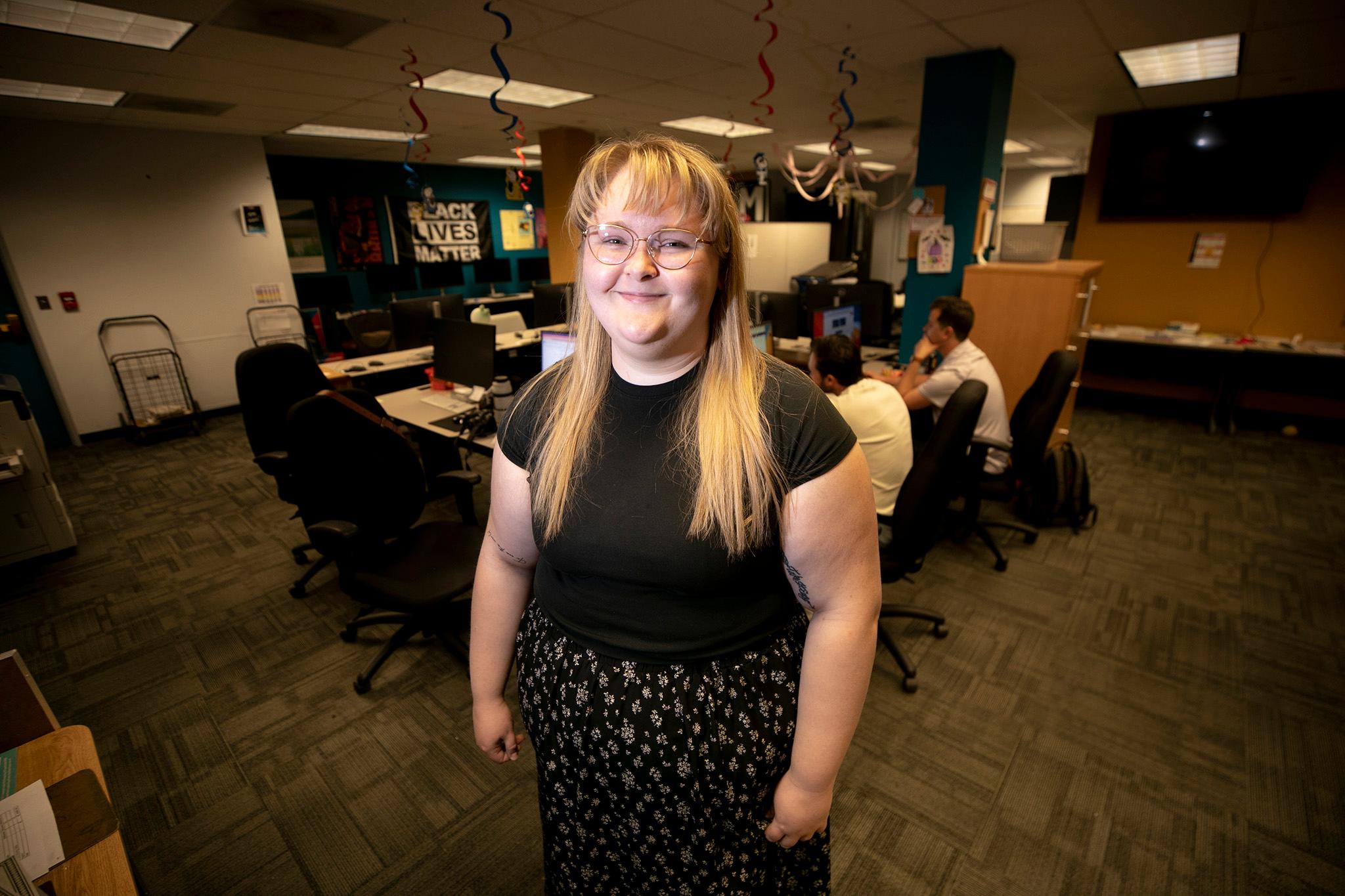
Tents went up on the Tivoli Quad — a greenspace shared by the University of Colorado Denver, Metropolitan State University of Denver, and Community College of Denver on the Auraria campus — a week ago as part of the nationwide movement of students protesting the war in Gaza.
Since the start of the war, more than 34,000 people have been killed according to a recent report from the New York Times.
College campuses from Pueblo to Fort Collins have joined the movement, but the four-acre lawn in Denver has remained the highest-profile demonstration in the state. And student journalists are leading the charge in news coverage.
The Auraria students are calling for their respective institutions to divest from companies in Israel and end study-abroad programs in the country. And while the institutions have not met these demands, the Auraria Higher Education Center has offered to donate $15,000 to the International Committee of the Red Cross in exchange for protesters to dismantle their camp.
Colorado Matters senior host Ryan Warner, sat down with Sara Martin, a senior at MSUD and editor-in-chief of The Metropolitan, the university’s student-run newspaper, to get perspective on how the protests are unfolding on the Auraria campus.
Martin said while bigger news outlets have come and gone, she and her team of student reporters have stayed on the quad — undeterred by the rain, snow, finals, looming graduation date, and even getting locked out of their newsroom by Denver police.
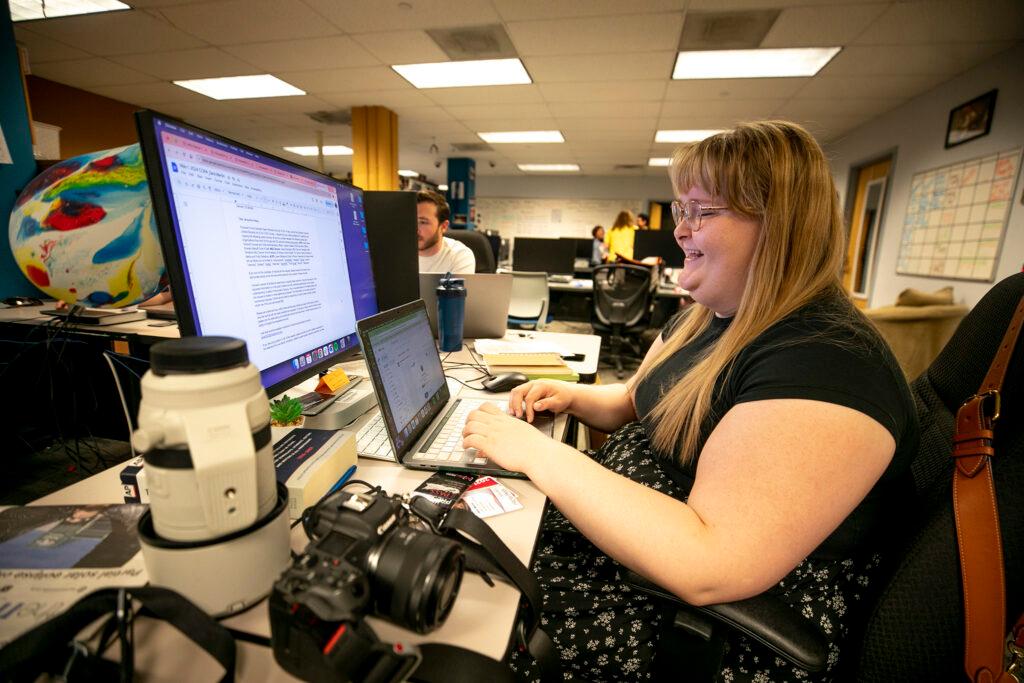
Read the interview
Editor’s note: This interview transcript has been edited for length and clarity.
Ryan Warner: One student protester mentioned how universities’ administrations are “sending money to Israel.” Would you say that's the core demand they're making?
Sara Martin: I believe they have a lot of core demands. One of them is to have a choice in where their money goes, even if that's US military contracts and armed forces, especially for MSU Denver, they have money coming in from Lockheed Martin.
Warner: What are some of the other demands you're hearing?
Martin: Transparency. That's number one. I believe that they're really wanting to know where this money is going. They want them to divest from any Israeli corporations.
Warner: You and I are recording this on Thursday afternoon. Walk us through the most important developments that are going on at Auraria this week. From remote classes for one institution to all sorts of discussion around encampments.
Martin: I think university leaders are taking a look back on what happened on Friday when 40 arrests were made. They've received a lot of reach out from community members and those members are really disappointed. I think they've taken a step back at looking at what happened to our community and they're not going to bring in police presence from what I'm hearing as of Thursday. They're just monitoring the situation. We have a lot of events coming up in the area. The Nuggets and the Colorado Avalanche are in the playoffs, so a lot of those watch parties happen on our quad. The Kentucky Derby is also this weekend, which is also on the quad, so I think they're taking steps to remove any parallel events that will be happening at the same time as the protest to mitigate any police presence.
Warner: When you say taking away those events, do you mean the protesters or do you mean the other events?
Martin: The other events. For example, this last weekend, there was a 5K race that was supposed to happen for some cancer survivors and that was canceled. So they're trying to move any events that are on the quad somewhere else.
Warner: With the idea of maintaining that space for the protests?
Martin: Yes.
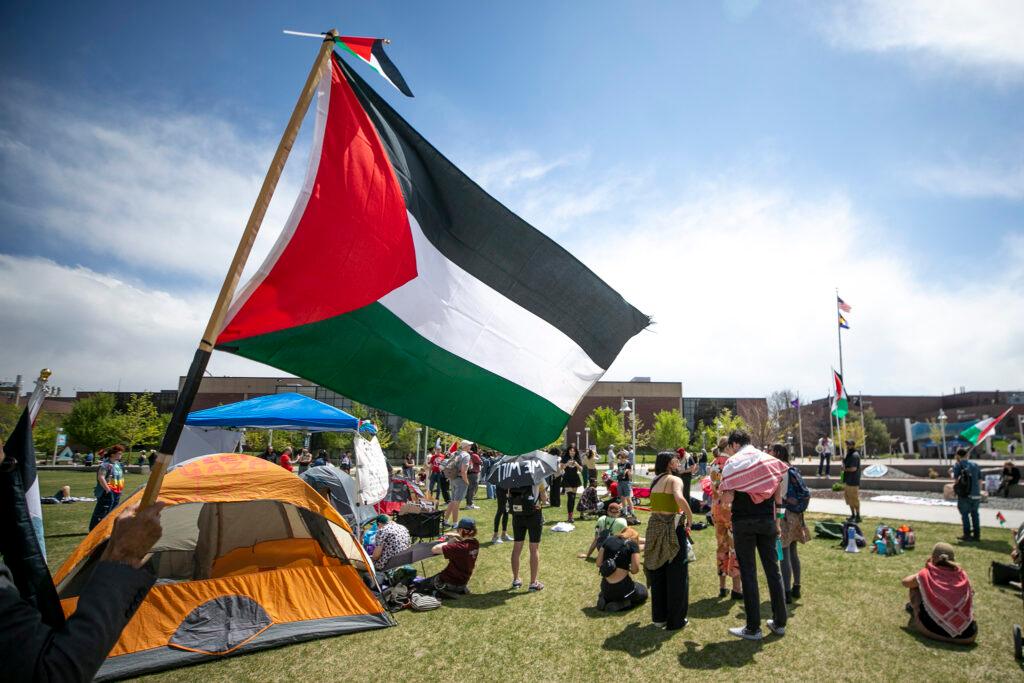
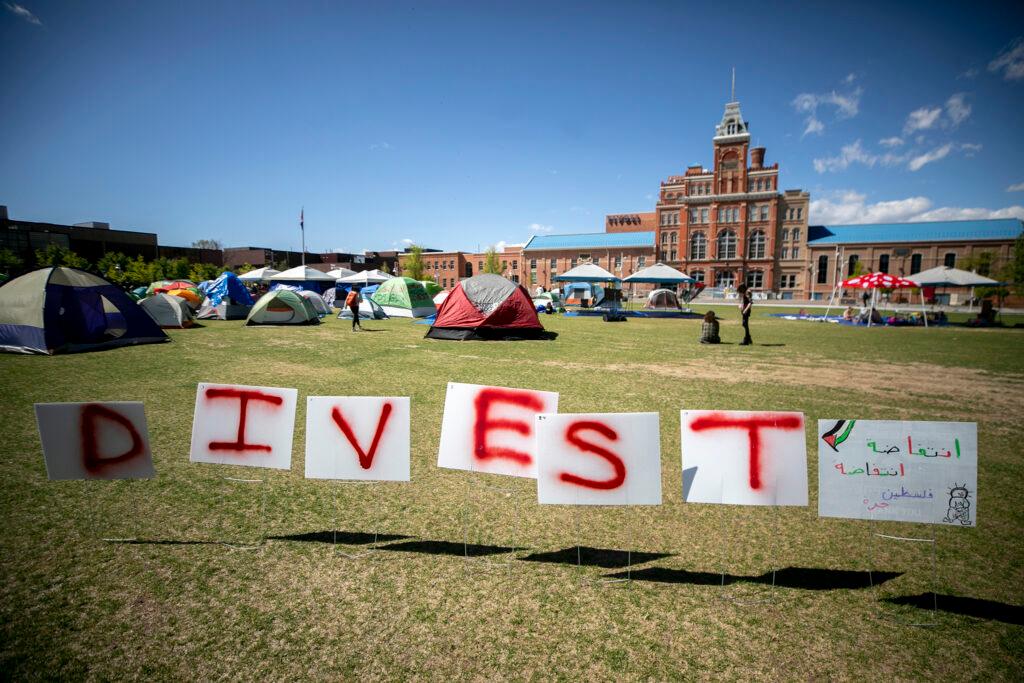
Warner: The Community College of Denver went remote this week. Did you have much coverage of that or much understanding of why?
Martin: I haven't spoken to a lot of CCD students. The majority have been from MSU Denver and CU, but we're out there on the ground every day trying to figure out who's out there and who's involved in the protests.
Warner: You mentioned those arrests last week, around 40 of them. From what you can tell, were they mostly students? Are the protesters from elsewhere? What do you know?
Martin: We're trying to really get to the bottom of that. I have a public records request out to our police department. It still hasn't been approved and it's been almost a week. I still can't get a list of those arrests. Even with Denver police, I still can't get a list. So from my eyewitness and from the other reporters that were on the ground with us, we do know that faculty members were arrested. I mean, I saw some of my friends and colleagues that I've worked with in classes that were also arrested out there. So in short, yes, there were many students and community members, like faculty or other administrative professionals that were out there as well.
Warner: I know you've conducted a fair number of interviews and many of those have been with people who have connections to Auraria. What have your conversations been with Jewish students at Auraria and what they're experiencing?
Martin: So far we've reached out to some Jewish organizations on campus. I haven't received anything back. I've also talked with some protesters there who are also Jewish and they're normally wearing shirts that say “not in our name.” I think they're most against human suffering at the end of the day. It's not a pro-Israel pro-Palestine issue, it's just the human suffering is the biggest thing they're concerned about.
Warner: Have you seen messages about releasing hostages? I know that's important, especially to those who feel an affinity towards Israel and there are Jews certainly calling for that.
Martin: I haven't seen any.
Warner: I do wonder how the communication has been between your publication, the Metropolitan, and MSU officials, Auraria campus officials?
Martin: Well, it's been interesting. We have been trying to get a hold of any officials and it's been really difficult for the last couple of days. I've been out on the Tivoli Quad. I have seen multiple higher administrators come on the quad outside and just kind of stand there, sip their coffee, look at the protesters, chat amongst themselves, and then they'll go inside. And every time I've seen someone come out — I saw MSU Denver's chief of staff and the president — I've tried to approach every person I've seen and they won't give me any comment.
Warner: What do you want to know from them? What are you eager to ask them?
Martin: I was talking earlier this week with some of my reporters and we want to really see a more holistic approach, especially with our student journalists. This is still our community that we're reporting on and when bigger media moves out — we're still here. We still want to maintain that relationship with our office of the president and our police presence. We will still be here three months from now, reporting.
Warner: That is to say that there was a fair amount of swooping in other media this week.
Martin: Yes, and I know that's a big narrative right now in a lot of communities. And we’ve seen that historically — a lot of big media does swoop in, gets the story, and it's gone the next day. And I think I'm seeing that on a hyperlocal level — I've read about it, but I've always been pretty much a student journalist.
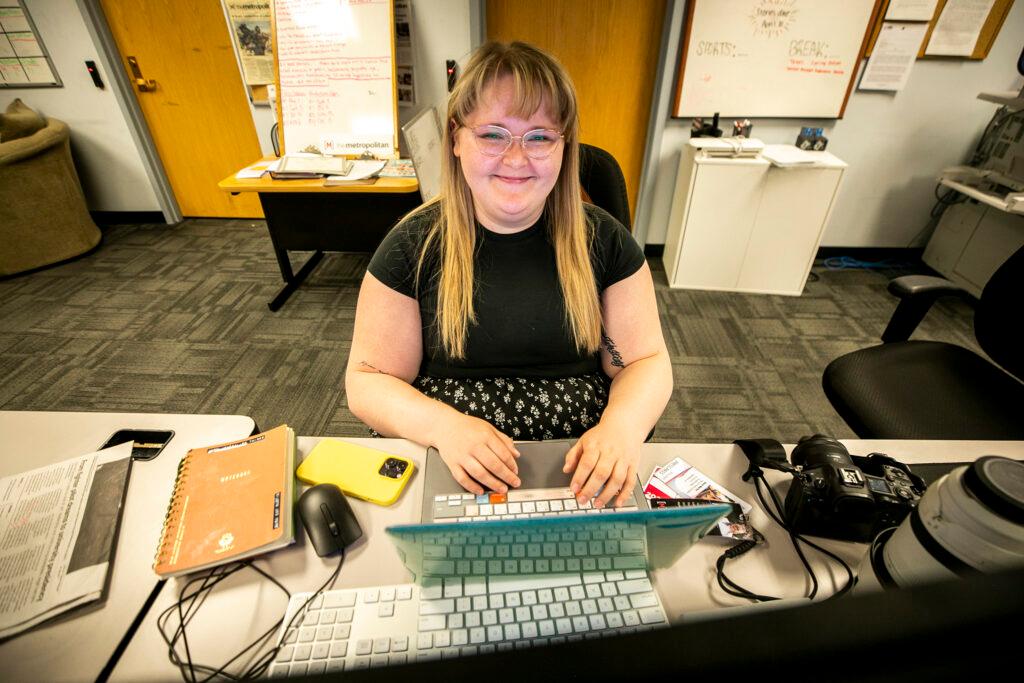
Warner: Noting you graduate from MSU next week. Congratulations. I do wonder if there's some frustration for you though towards the end of your tenure there as you've been trying to have communication with your own school.
Martin: I think my tenure is starting and ending the same way. I started at MSU and at the paper covering 2020, the Black Lives Matter protest with George Floyd, the COVID-19 pandemic, and that's really coming full circle, but in a really different way. When the Black Lives Matter protests happened, we received a lot of statements and emails from the university president and I specifically remember looking at those and she was pretty much in solidarity with the Black Lives Matter protesters and calling for less police presence and all of that … which is very, very contradictory to what happened last Friday.
Warner: That is to say where you witnessed solidarity on one issue, you’re not seeing that on this. What conversations do you have with your staff about balance? I imagine that that's coming up a lot right now.
Martin: It's really a culmination of things with my staff because they're so young. I mean even I'm very young. I was born in 2000, I was born a year before the 9/11 attacks. And dealing with a lot of those issues in the Middle East, that's also another thing. My staff is still trying to learn and understand the implications of the US in the Middle East historically. And learn how to balance that as a reporter when you're so young. I think Wednesday came to a breaking point with my staff. Everyone has been going for about 11 days straight reporting. We've been there over the weekend and in the rain, in the snow, in the hail.
Warner: And on lockdown during those arrests Friday, right? Because the student union was on lockdown and that's where your offices are?
Martin: Yes, we were actually locked out of our newsroom that Friday too. We weren't able to get in and we were denied access by the police.
Warner: So you were filing on your phones or what?
Martin: We were trying to file on our phones, but I actually had someone sitting up in our newsroom just in case anything were to happen and we were able to sneak in through a stairwell corridor to get into our offices.
Warner: I see. There's no inherent condoning of that in this conversation, but it's a reality of what happened. What did it feel like and look like to say that your staff reached something of a breaking point? How did you know that? How did you feel that?
Martin: We were all in the office. I could see the tension. We were just constantly on call, monitoring our phones and going out on the Tivoli Quad to see if anything was happening. We were all just kind of talking about what was going on and everyone I think just had a collective cry on the mental toll I think this has taken on everyone.
Warner: Don’t you have finals soon?
Martin: We have finals right now.
Warner: How are you juggling?
Martin: I'm not juggling, Ryan. It's going okay. It's just trying to compartmentalize what our community needs to know and also trying to get our finals done as well. A majority of my staff is graduating. There will be only two people left on the paper once we're done this semester.
But it's a balance and it's also part of the experience too. I'm really thankful that I've had the experience covering some of the things that I have.
Warner: You ran through just a few of the stories during your tenure: the pandemic, the Black Lives Matter protests against police brutality, and now the protests over the war in Gaza. I mean, this stuff is formative.
Martin: It is really formative. And our student journalists, I think, really need this moment. They're going to learn how to report on breaking news, but also learn how to manage their mental health as a journalist.
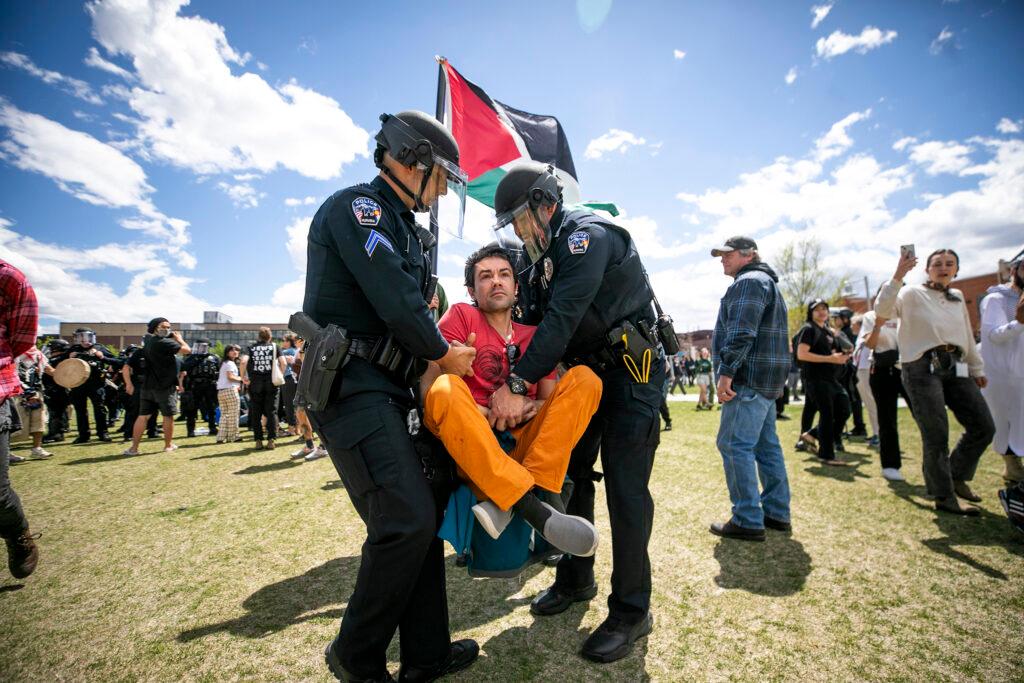
Warner: Campus protests across the country, of course, have drawn remarks from the president. Let's listen to some of what he had to say Thursday.
President Biden: “So let me be clear. Peaceful protest in America, violent protest is not protected. Peaceful protest is. It's against the law when violence occurs. Destroying property is not a peaceful protest. It's against the law. Vandalism, trespassing, breaking windows, shutting down campuses, forcing the cancellation of classes and graduations. None of this is a peaceful protest. Threatening people, intimidating people, instilling fear in people is not peaceful protest. It's against the law.”
Warner: I mean, here you are covering a hyper-local story that's also a big national one. How would you say it's made you a better journalist or what have you learned?
Martin: It’s really inspiring to see the journalists around the country. I've been following a lot of student journalists on social media. It's been so inspiring to see the hard work that everyone's been doing to make sure this news gets out. Because even at Columbia, when big media isn't even allowed on campus, (student journalists) are the people who are reporting the most important news right now and how students and community members are being treated. And that's good journalism and that's important journalism.
Warner: It’s access, which is so critical. Sara, I'm very curious, do you have a job lined up?
Martin: I don't have a job lined up, but I am going to attend the University of California Berkeley Journalism School this fall.









